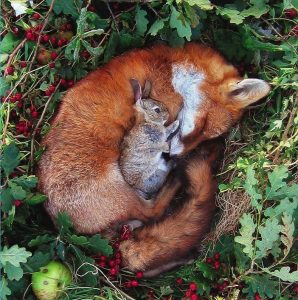 The Yogabliss, Two Rivers/RiverTree Yoga on-line Moving into Meditation classes met this morning. Today many of us come together to honor and to remember the people who have mothered us – those dear ones who have given themselves to us in love. We explored the many ways mothering happens between humans and more than humans. We considered mothering memories that travel from being to being and across time. We also reflected on our experience of mothering, nurturing, guiding and mentoring others.
The Yogabliss, Two Rivers/RiverTree Yoga on-line Moving into Meditation classes met this morning. Today many of us come together to honor and to remember the people who have mothered us – those dear ones who have given themselves to us in love. We explored the many ways mothering happens between humans and more than humans. We considered mothering memories that travel from being to being and across time. We also reflected on our experience of mothering, nurturing, guiding and mentoring others.
Poet Joy Harjo’s beautiful poem, Remember, called upon all our relations, reminding us of the broader kinship we hold with life.
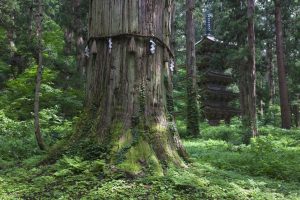 We drew on Dr. Suzanne Simard’s new book, Finding the Mother Tree. Her work reminds us of the more than human mothers that nourish and sustain world around us. Suzanne is best known for her groundbreaking research that demonstrated how trees communicate and exchange resources through networks of mycorrhizal fungi in the soil. She continues to explore the ways trees recognize and support their kin. You can hear a fascinating discussion, Finding the Mother Tree, hosted by Emergence Magazine.
We drew on Dr. Suzanne Simard’s new book, Finding the Mother Tree. Her work reminds us of the more than human mothers that nourish and sustain world around us. Suzanne is best known for her groundbreaking research that demonstrated how trees communicate and exchange resources through networks of mycorrhizal fungi in the soil. She continues to explore the ways trees recognize and support their kin. You can hear a fascinating discussion, Finding the Mother Tree, hosted by Emergence Magazine.
Finally, we heard Anne Haven McDonnell’s poem, She Told Me the Earth Loves us. Anne is author of the poetry book, Living With Wolves. For a real treat you can hear Anne read four of her poems at Terrain on-line journal. My favorite is How to Sit With a Wolf.
Relaxed Reflection
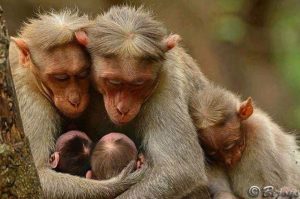 Think of someone who has mothered you – who gifted you many small acts of care. Mothers . . . grandmothers . . . fathers . . . grandfathers . . . aunties . . . uncles . . . someone who guided and mentored you . . . Bring that person into your heart . . . and feel the love this person has given you. Perhaps memories surface with experiences you shared together . . . special occasions or the every day moments spent driving to school, grocery shopping, mealtimes . . . bedtimes . . . Tune into the love you shared . . . let it come alive in your heart . . .
Think of someone who has mothered you – who gifted you many small acts of care. Mothers . . . grandmothers . . . fathers . . . grandfathers . . . aunties . . . uncles . . . someone who guided and mentored you . . . Bring that person into your heart . . . and feel the love this person has given you. Perhaps memories surface with experiences you shared together . . . special occasions or the every day moments spent driving to school, grocery shopping, mealtimes . . . bedtimes . . . Tune into the love you shared . . . let it come alive in your heart . . .
Now take a moment to send this person your love . . . thank them for sharing love with you. Imagine your love living in their heart – even if they have passed on – you can know that your love once lived in their heart. . . your presence kindled happiness and joy . . . Together you form a circle of love a flow of giving and receiving . . . This is the love that makes life possible. Imagine this love touching all the mothering beings and young ones in the world.
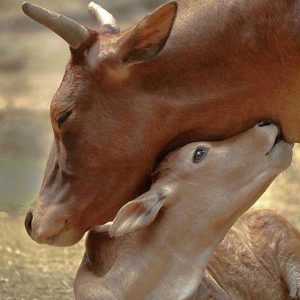 Giving and receiving loving kindness is at the heart of our practice. The Buddha taught: ‘Even as a mother protects with her life her child, her only child, So with boundless heart should one cherish all living beings; Radiating kindness over the entire world:’
Giving and receiving loving kindness is at the heart of our practice. The Buddha taught: ‘Even as a mother protects with her life her child, her only child, So with boundless heart should one cherish all living beings; Radiating kindness over the entire world:’
We can all be “allomothers” – we – other than mothers – can care and nurture, companion and guide other beings in our lives. This, too, is at the heart of our practice. The Pali word for mindfulness is Sati – to remember. Meditation is about re-membering – embracing all members with our care. In her poem, Remember, Joy Harjo calls on us to remember all of life:
Remember the sky that you were born under,
know each of the star’s stories.
Remember the moon, know who she is.
Remember the sun’s birth at dawn, that is the
strongest point of time. Remember sundown
and the giving away to night.
Remember your birth, how your mother struggled
to give you form and breath. You are evidence of
her life, and her mother’s, and hers.
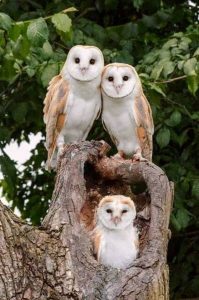 Remember your father. He is your life, also.
Remember your father. He is your life, also.
Remember the earth whose skin you are:
red earth, black earth, yellow earth, white earth
brown earth, we are earth.
Remember the plants, trees, animal life who all have their
tribes, their families, their histories, too. Talk to them,
listen to them. They are alive poems.
Remember the wind. Remember her voice. She knows the
origin of this universe.
Remember you are all people and all people
are you.
Remember you are this universe and this
universe is you.
Remember all is in motion, is growing, is you.
Remember language comes from this.
Remember the dance language is, that life is.
Remember
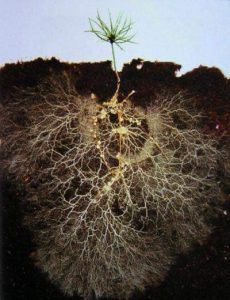 All living beings require love to survive. This love moves from being to being and through time from ancestors to future generations. This love informs the wisdom that enables life to adapt in even the harshest conditions. We are social beings that cooperate for our survival. We can see this inter-relatedness, this inter-dependance, throughout our natural world. In her book Finding the Mother Tree, scientist, author Suzanne Simard writes about the Tree:
All living beings require love to survive. This love moves from being to being and through time from ancestors to future generations. This love informs the wisdom that enables life to adapt in even the harshest conditions. We are social beings that cooperate for our survival. We can see this inter-relatedness, this inter-dependance, throughout our natural world. In her book Finding the Mother Tree, scientist, author Suzanne Simard writes about the Tree:
Elders that survived climate changes in the past ought to be kept around because they can spread their seed into the disturbed areas and pass their genes and energy and resilience into the future . . . When Mother Trees. . . die, they pass their wisdom to their kin, generation after generation, sharing the knowledge of what helps and what harms, who is friend or foe, and how to adapt and survive in an ever-changing landscape. It’s what all parents do.
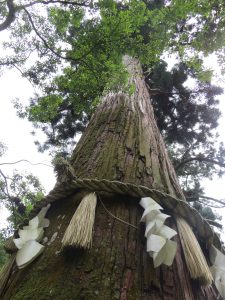 Suzanne discovered that Mother Trees nurture their own seedlings and even those of other species of trees. Her work shows that a forest is not just collection of individual trees competing for light and nutrients. A forest is a sentient, interacting community.
Suzanne discovered that Mother Trees nurture their own seedlings and even those of other species of trees. Her work shows that a forest is not just collection of individual trees competing for light and nutrients. A forest is a sentient, interacting community.
Like humans, elephants are long-lived social animals. They live in families which make decisions together for mutual safety and survival. Like humans, elephants allomother – other than mothers protect calves and assist new-born calves to stand, walk and swim.
Humans, elephants and killer whales all increase their grandchildren’s chances to survive. This is called the grandmother effect. Grandmother killer whales have decades of knowledge about the behavior of food – the Chinook salmon. They both find and share food with their grandchildren.
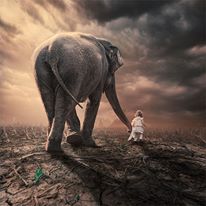 Sometimes we forget our true nature. We forget that we are not individuals competing for light and nutrients. We can remember that we have a huge family – we can open our hearts and extend our caring and concern for all beings. We can remember how we are embedded in this family from which we can receive care and compassion. We forget and we remember again and again – as poet Anne Haven McDonnell reminds us in her poem:
Sometimes we forget our true nature. We forget that we are not individuals competing for light and nutrients. We can remember that we have a huge family – we can open our hearts and extend our caring and concern for all beings. We can remember how we are embedded in this family from which we can receive care and compassion. We forget and we remember again and again – as poet Anne Haven McDonnell reminds us in her poem:
She Told Me the Earth Loves Us
She said it softly, without a need
for conviction or romance.
After everything? I asked, ashamed.
That’s not the kind of love she meant.
She walked through a field of gray
beetle-pored pine, snags branching
like polished bone. I forget sometimes
how trees look at me with the generosity
of water. I forget all the other
breath I’m breathing in.
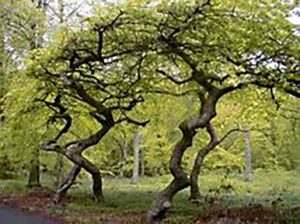 Today I learned that trees can’t sleep
Today I learned that trees can’t sleep
with our lights on. That they knit
a forest in their language, their feelings.
This is not a metaphor.
Like seeing a face across a crowd,
we are learning all the old things,
newly shined and numbered.
I’m always looking
for a place to lie down
and cry. Green, mossed, shaded.
Or rock-quiet, empty. Somewhere
to hush and start over.
I put on my antlers in the sun.
I walk through the dark gates of the trees.
Grief waters my footsteps, leaving
a trail that glistens.
